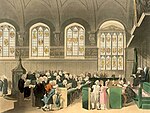
Back Estoppel AST Acte propi Catalan Estoppel German Doctrina de los actos propios Spanish استاپل Persian Estoppel French השתק HE Estoppel Italian 禁反言の法理 Japanese Эстоппель Kazakh
| Equitable doctrines |
|---|
 |
| Doctrines |
| Defences |
| Equitable remedies |
| Related |
Estoppel is a judicial device in common law legal systems whereby a court may prevent or "estop" a person from making assertions or from going back on their word; the person so prevented is said to be "estopped".[1][2][3] Estoppel may prevent someone from bringing a particular claim. Legal doctrines of estoppel are based in both common law and equity.[4][5] Estoppel is also a concept in international law.[6]
- ^ "Estoppel". Wex. Cornell Law School. Retrieved 16 October 2021.
- ^ Black's Law Dictionary defines estoppel as a "bar or impediment raised by the law, which precludes a man from alleging or from denying a certain fact or state of facts, in consequence of his previous allegation or denial or conduct or admission, or in consequence of a final adjudication of the matter in a court of law".
- ^ "Estoppel". Black's Law Dictionary. 9 November 2011. Archived from the original on 13 December 2015. Retrieved 18 December 2015.
- ^ See Jorden v Money [1854] 10 ER 868
- ^ "Jorden, And Louisa, His Wife v Money: HL 30 Jul 1854". 23 July 2022. Retrieved 4 April 2023.
- ^ T. Cotter, H. P. Müller, "Estoppel" in Max Planck encyclopedia of Public International Law, April 2007.
© MMXXIII Rich X Search. We shall prevail. All rights reserved. Rich X Search